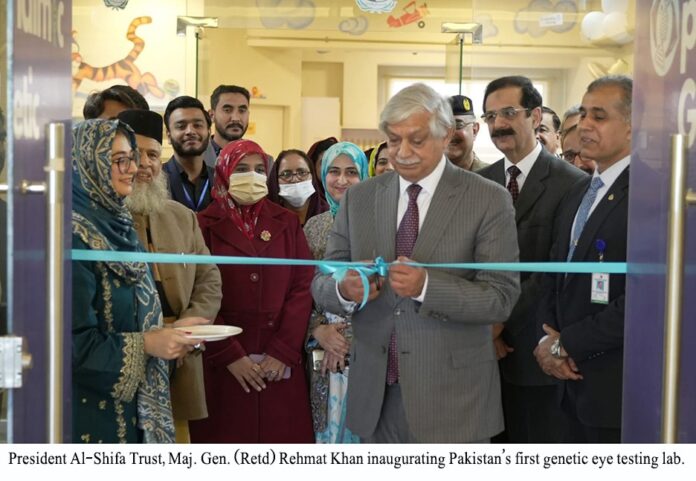- Expensive process of genetic testing, DNA diagnosis to be offered free of cost
ISLAMABAD: Al-Shifa Trust Eye Hospital inaugurated a state-of-the-art genetic testing laboratory to prevent and control eye cancer in children.
Genetic testing offers significant benefits; it can alleviate uncertainty and guide individuals in making informed decisions about healthcare management. If the result is negative, it may reduce the need for unnecessary check-ups, said the president of Al-Shifa Trust, Major General (Retd) Rehmat Khan.
Speaking at a seminar at the inauguration of Pakistan’s first genetic testing lab for eyes, he said that a positive outcome following genetic testing can guide individuals toward available options for prevention, monitoring, and treatment.
Major General (Retd) Rehmat Khan said that all the patients at the trust will get free testing even though ophthalmic genetics and DNA diagnosis are very costly processes.
Ophthalmic genetics is a subspecialty of ophthalmology focusing on genetic conditions affecting the eye, which involves studying the causes, patterns of transmission, projection, and treatment of eye diseases caused by genetic defects, he informed.
Speaking at the occasion, Dr Tayyab Afghani, consultant and HOD of Orbit and Oculoplastic Department at Al-Shifa Trust Eye Hospital, said that Pakistan has a higher rate of eye cancer in children than its nearby countries. Because of this, the trust has chosen to step up its efforts to fight the problem.
He said that every year, different trust centres treat about 700 kids with eye cancer. This is twice as many as in India, right next door.
He added that genetic testing of parents can help control this occurrence in future generations. These tests provide information about how likely cancer will be possible in children.
Tayyab Afghani said that if the problem is found early, it can be fixed before it worsens and could lead to loss of sight, eye loss, or even total blindness.
He said people should not be careless about eye cancer. The number of people with eye cancer is going up, so they should see a doctor right away. Most people who go to hospitals are in the very last stages of their illness.
Afghani said that most of the kids with eye cancer come from low-income families who live in far-flung areas where there aren’t any specialised eye hospitals.
He said that some tumours are incurable, while others may severely disfigure eyes, requiring complex surgical procedures. However, eye problems due to cancer need more time and effort to be treated.
Dr Rutaba Gul briefed the media persons about the development. Others who spoke on occasion included Prof. Dr. Shahid Mehmood Baig, Prof. Dr. Saba Irshad, Prof. Dr. Aneesa Sultan, Dr. Saad Sarfaraz, Dr Faheem Azher, and Prof. Dr. Wajid Ali Khan.

